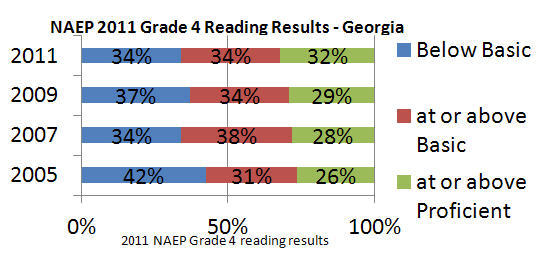
The Early Literacy Initiative
February 6, 2012
In the 2012 State of the State address, Governor Nathan Deal introduced a new initiative to improve early literacy in Georgia. The Governor's proposal calls for directing $1.6 million in the state budget to a reading mentor program that will improve the percentage of children reading at grade level by the end of third grade. The research on early literacy consistently indicates that the ability to read at grade level by third grade is a strong indicator of future academic success, and early literacy skills often serve as a foundation for future learning across subject areas.
Third grade is a pivotal point in elementary education at which students transition from learning the mechanics of reading to utilizing reading comprehension as a tool for understanding curriculum content. According to The Children's Reading Foundation, "up to half the printed fourth grade curriculum is incomprehensible to students who read below that grade level ... and three quarters of students who are poor readers in third grade will remain poor readers in high school." As a result, students who are not proficient in reading by the end of third grade face significant challenges in understanding the curriculum--regardless of subject area--in all subsequent grade levels. The detrimental impact of low-level literacy is further highlighted in Donald Hernandez's article, Double Jeopardy: How Third Grade Reading Skills and Poverty Influence High School Graduation, in which he reports that students who do not read proficiently by third grade are four times more likely to leave school without a diploma than their reading-proficient peers.
The implications of developing strong early literacy skills are evident even beyond the 12th grade. In the report titled, Reading on Grade Level in Third Grade: How is it Related to High School Performance and College Enrollment?, professors at the University of Chicago found that students reading above grade level in third grade are more likely to be at or above grade level in eighth grade. These students also graduate and enroll in college at higher rates than students reading below grade-level by the end of third grade; specifically, 20 percent of below-grade-level readers enrolled in college, whereas one-third of grade level readers enrolled in college and 60 percent of above-level readers enrolled in college.
Based on these figures, the economic impact of strong early literacy is clear. According to the Annie E. Casey Foundation, the median annual income of a high school dropout in 2007 was $23,000 while a college graduate holding a bachelor's degree or higher earned closer to $48,000 per year. Additionally, it is projected that the United States will need 60 percent of its population to possess a post-secondary degree or credential by 2025 to remain globally competitive. This represents an increase of 16 million more degrees than are currently earned by graduates. Specifically, the state of Georgia will need approximately 250,000 additional college/certificate graduates over the next eight years in order to meet future workforce demands (as reported in GOSA's December education update). To achieve this level of production, the number of students reading proficiently by the end of third grade must increase so as to enable the realization of the state's long term goal: graduating higher percentages of students who are college and career ready.
While Georgia is making strides in the area of early literacy, there is more work to be done. In 2011, 68 percent of Georgia fourth graders were not proficient according to the National Assessment of Educational Progress (NAEP) reading assessment. This is a slight improvement from 2009, when 71 percent of Georgia fourth graders scored below-proficient on the NAEP assessment.

Early intervention is critical. As Governor Deal stated, "when we fail to invest in our youngest students, we are forced to spend money on remediation for the remainder of their academic careers." Research shows that for the vast majority of below-grade-level readers (85-90 percent), strong prevention and intervention programs can boost reading skills to average grade levels if implemented before third grade. However, if intervention is delayed even by a year, the vast majority (approximately 75 percent) of children will continue to struggle with reading throughout high school and into adulthood. Through the proposed reading mentor program, Georgia will take a very important step forward to ensure all students possess strong literacy skills that enable long-term academic success.